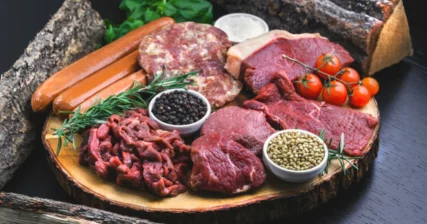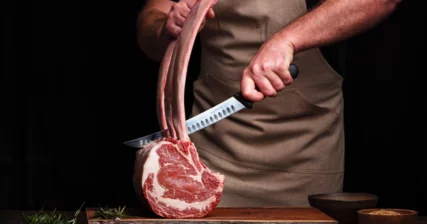Contrary to what the media would have you believe, meat, poultry, fish, eggs, wild game, and other animal-based protein-rich foods are good for you.
Research has continually proven this to be true. And yet, activist organizations, mainstream media, and politicians would have you believe that a lower-protein, plant-based diet is the answer to health, fitness, and a higher quality of life.
I’ve written about the importance of this macronutrient in the past, here, here, and here.
A new study, titled Higher protein intake during caloric restriction improves diet quality and attenuates loss of lean body mass, adds another layer of evidence we need to eat more, not less.
As the title suggests, they found that higher protein intakes led to better overall diet quality. Here’s the rest of what they discovered.

Feel Better Fast. Guaranteed.
Energy+, EDGE, and MentaBiotics make up the Happy Juice supplement stack, with ingredients clinically proven to:
- decrease anxiousness scores by 55%
- decrease irritability scores by 60%
- decrease fatigue by 64%
- decrease anger 54%
- decrease tension by 45%
- decrease confusion by 43%
- decrease overall distress by 49%
- increase good bacteria by 70%
- decrease negative mood by 105%
- increase positive mood by 211%
How does protein intake affect other food choices?
In this new study, researchers analyzed the impact of higher protein intakes on overall diet quality in those on calorie-restricted diets.
They compared the diet quality of adults on a lower-protein, calorie-restricted diet against those on a higher-protein, calorie-restricted diet.
I need to emphasize that the latter group ate a diet higher in protein than the first group, but it was hardly a “high-protein diet.” The first group averaged only 58 grams per day, while the second group averaged 79 grams per day. That’s still a paltry level compared to the more optimal 1 gram per pound ideal bodyweight. Yet, the 21 gram per day difference between the two groups significantly affected overall diet quality and body composition.
Here’s what they found.
Similar Weight Loss, But Better Body Composition
Both groups lost comparable weight during the diet, but the higher-protein group retained more muscle mass and lost more body fat. This is a crucial difference, as muscle loss leads to lower metabolic rates, insulin resistance, reduced lifespan, and increases in all-cause mortality.
A low-protein diet is detrimental to health and longevity.
Read also: Low-Carb vs Low-Fat vs High-Protein: Which diet is best?
Improved Intake of Other Nutrient-Rich Foods
Without being directed to do so, the higher-protein group ate more dark green vegetables, fewer refined grains and less added sugar.
Again, for me, this is not surprising, as higher intakes increase satiety and decrease cravings for carb and sugar-rich foods.
Yet, that isn’t what we’re told by “experts.” They want us to believe that meat-eating causes us to eat a lower-quality diet, full of processed and junk foods. Not so.
Increased Micronutrient Intakes
Animal proteins aren’t just rich in protein, they’re also a great micronutrient source.
The research group found…
greater protein density was positively associated with multiple B vitamins, choline, and vitamins A, C, D, and K, as well as multiple minerals. Others have found that protein from animal sources increases consumption of zinc, potassium, vitamin B12, riboflavin, and folate.
While protein-rich foods contain a variety of micronutrients, they still help us reach optimal levels without taking a high-quality multivitamin. But the researchers’ point above does go against the idea that vegetables and fruit are the only good sources of essential micronutrients.
Read also: 5 Reasons Low-Calorie Diets Don’t Work Long-Term.
How to Make Protein More of a Priority
These findings align well with what I’ve seen work time and again with my clients.
When we work on their nutrition, I take them through a step-by-step process that looks like this:
- Eat a high-protein meal or snack with each meal. For women, I generally recommend 30 grams or more per meal or snack; for men, 40 grams.
- Eat protein first with a meal. By doing so, you fill up on it and eat less of other foods, such as carb-rich sides.
- Eat a daily total of protein equal to 1 gram per pound ideal bodyweight. Women can usually get by with 0.8 grams, but there’s nothing wrong with eating more. The one exception would be for those with PCOS, where protein requirements are lower, and carbohydrate intakes should be minimized.
- Eat meals, not snacks.
Some clients can tackle all of these within a few weeks. For others, it can take several months to work through them, making them a consistent part of their lifestyle.
I’ve found that by working through these four steps, we rarely discuss the carbs or fat in their diet. They end up eating less of them without thinking about it. The higher protein consumption crowds out the macronutrients.
The effect of higher protein intake during WL (weight loss) on health outcomes has been reported extensively, and there is evidence that it can promote a healthy body weight, attenuate loss of muscle mass, and reduce chronic disease.
Eat more protein, get leaner, stronger, and healthier.
Most measures of protein quality by amino acid composition and digestibility (protein digestibility-corrected amino acid score and digestible indispensable amino acid score) suggest that proteins from animal sources are more complete to varying degrees than plant sources.
And go ahead and eat plants. Just don’t eat them in place of animal-based proteins.



